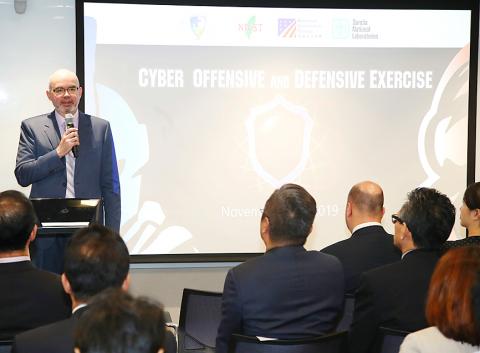The first-ever international cyberexercises cohosted by Taiwan and the US opened yesterday in Taipei, with global cyberattacks, especially from North Korea and China, the focus of the five-day event.
Taiwan has been holding the Cyber Offensive and Defensive Exercises (CODE) every two years since 2013, but this year is the first time that foreign teams have participated. More than 10 countries — including Australia, the Czech Republic, Japan and Malaysia — have sent participants.
Speaking at the opening ceremony at Microsoft Taiwan’s offices, American Institute in Taiwan (AIT) Deputy Director Raymond Greene said this year’s exercises mark a new frontier in ever-deepening cybercooperation between the US and Taiwan.

Photo: CNA
They are aimed at strengthening domestic cyberdefenses and related skills, and promoting closer international cooperation on cybersecurity, he said.
“Ultimately, the success of this week will be measured by whether all of you remain in close contact with each other after the exercises are over,” Greene said.
Greene was standing in for AIT Director Brent Christensen, who yesterday joined Taiwan External Trade Development Council (外貿協會) Chairman James Huang (黃志芳) in leading a delegation to the Indo-Pacific Business Forum in Bangkok.
The AIT has been working closely with Taiwanese authorities to bring Taiwan into the US Department of Homeland Security’s Automated Indicator Sharing system, which shares cyberthreat indicators at machine speed, Green said.
The biggest threats today are no longer troops landing on beaches, but efforts by malign actors to use the openness of societies and networks to attack industries, democratic institutions and the integrity of critical infrastructure, he said.
Taiwan is particularly threatened by such attacks, with its public sector facing an average of 30 million cross-border cyberattacks per month last year, Department of Cybersecurity Director-General Howard Jyan (簡宏偉) said.
Although only a small fraction of them resulted in theft or tampering of confidential or sensitive information, the number of cyberattacks against Taiwan are considered high compared with European countries, which are hit by an average of several thousand attacks monthly, Jyan said.
When pressed by reporters, he estimated that about half of the attacks came from China, but said that it is not the only malign actor being given attention at this week’s exercises.
The exercises include training and exercises provided by the US government on North Korea’s cyberthreats, live-action exercises and a discussion on lessons learned, the AIT said.
A seminar on North Korean hacking makes up the first days.
The simulation, which begins tomorrow, is to see red teams made up of foreign and Taiwanese specialists launch simulated attacks on Taiwanese government and financial institutions’ Web sites, while a blue team of just Taiwanese experts are to try to detect and defend against those threats.

DEFENDING DEMOCRACY: Taiwan shares the same values as those that fought in WWII, and nations must unite to halt the expansion of a new authoritarian bloc, Lai said The government yesterday held a commemoration ceremony for Victory in Europe (V-E) Day, joining the rest of the world for the first time to mark the anniversary of the end of World War II in Europe. Taiwan honoring V-E Day signifies “our growing connections with the international community,” President William Lai (賴清德) said at a reception in Taipei on the 80th anniversary of V-E Day. One of the major lessons of World War II is that “authoritarianism and aggression lead only to slaughter, tragedy and greater inequality,” Lai said. Even more importantly, the war also taught people that “those who cherish peace cannot

STEADFAST FRIEND: The bills encourage increased Taiwan-US engagement and address China’s distortion of UN Resolution 2758 to isolate Taiwan internationally The Presidential Office yesterday thanked the US House of Representatives for unanimously passing two Taiwan-related bills highlighting its solid support for Taiwan’s democracy and global participation, and for deepening bilateral relations. One of the bills, the Taiwan Assurance Implementation Act, requires the US Department of State to periodically review its guidelines for engagement with Taiwan, and report to the US Congress on the guidelines and plans to lift self-imposed limitations on US-Taiwan engagement. The other bill is the Taiwan International Solidarity Act, which clarifies that UN Resolution 2758 does not address the issue of the representation of Taiwan or its people in

US Indo-Pacific Commander Admiral Samuel Paparo on Friday expressed concern over the rate at which China is diversifying its military exercises, the Financial Times (FT) reported on Saturday. “The rates of change on the depth and breadth of their exercises is the one non-linear effect that I’ve seen in the last year that wakes me up at night or keeps me up at night,” Paparo was quoted by FT as saying while attending the annual Sedona Forum at the McCain Institute in Arizona. Paparo also expressed concern over the speed with which China was expanding its military. While the US

‘FALLACY’: Xi’s assertions that Taiwan was given to the PRC after WWII confused right and wrong, and were contrary to the facts, the Ministry of Foreign Affairs said The Ministry of Foreign Affairs yesterday called Chinese President Xi Jinping’s (習近平) claim that China historically has sovereignty over Taiwan “deceptive” and “contrary to the facts.” In an article published on Wednesday in the Russian state-run Rossiyskaya Gazeta, Xi said that this year not only marks 80 years since the end of World War II and the founding of the UN, but also “Taiwan’s restoration to China.” “A series of instruments with legal effect under international law, including the Cairo Declaration and the Potsdam Declaration have affirmed China’s sovereignty over Taiwan,” Xi wrote. “The historical and legal fact” of these documents, as well